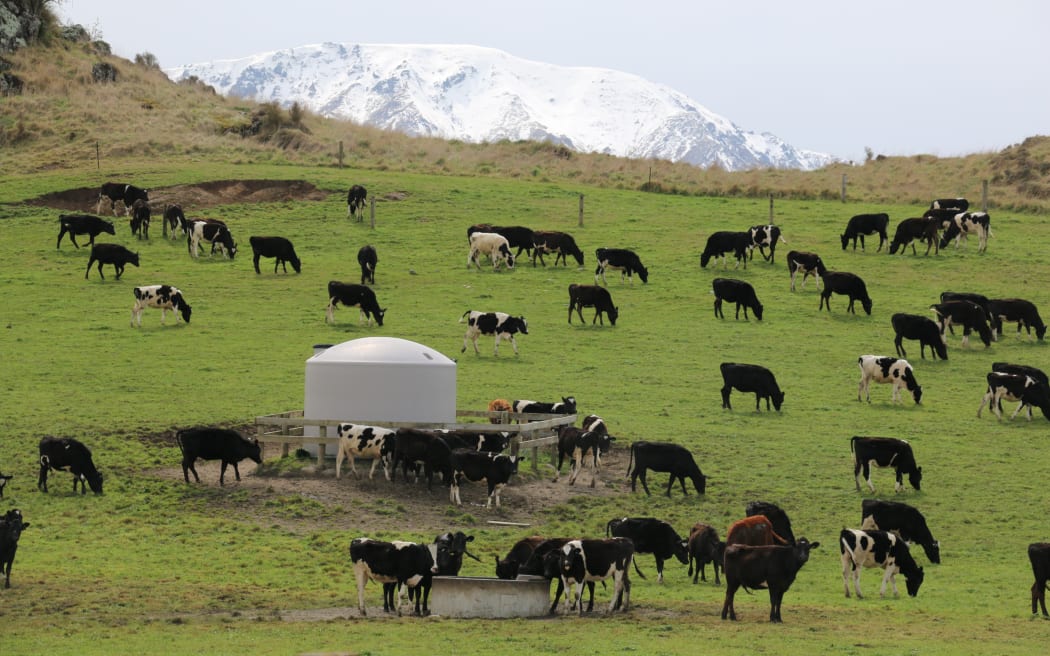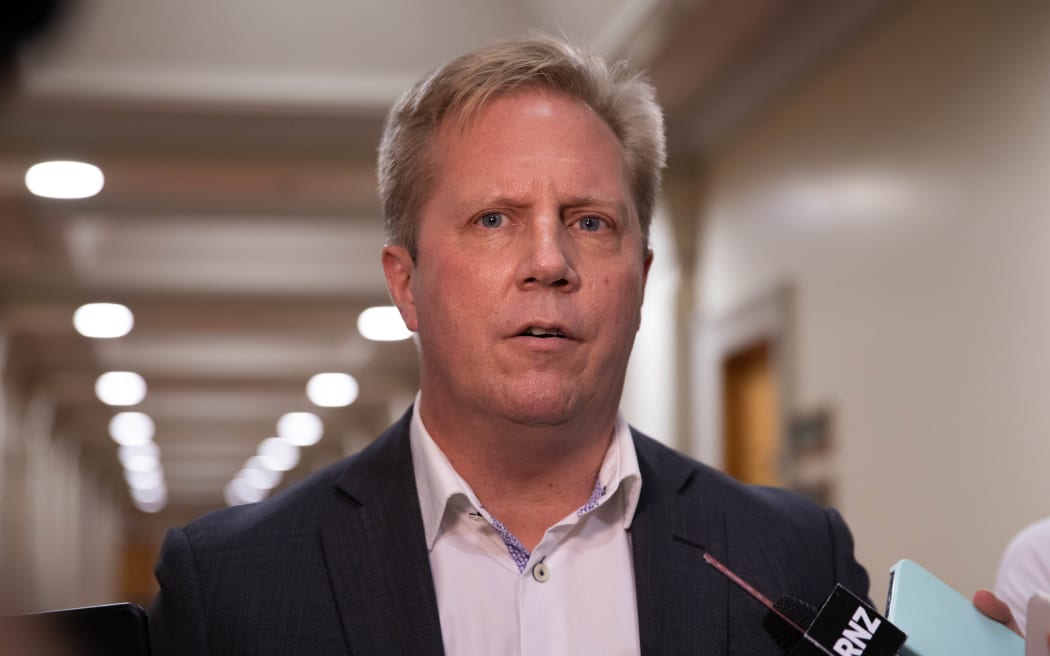
National has announced how it plans to reduce agricultural emissions if elected, saying its policy would help farmers and growers embrace new technology to meet New Zealand's climate targets (file photo). Photo: RNZ / Cosmo Kentish-Barnes
The National Party has announced its plan to reduce agricultural emissions, including pushing back the final deadline by which farmers have to start paying for them.
Agriculture makes up nearly half of New Zealand's greenhouse gas emissions and - unlike emissions from every other sector - are not priced.
A sector-led group called He Waka Eke Noa is currently working on how to best to do this but its future is uncertain, given National last week walked back its support on account of the impact the proposed scheme might have on farming businesses.
On Monday, the party announced how it planned to reduce agricultural emissions if elected, saying its policy would help farmers and growers embrace new technology to meet New Zealand's climate targets.
"National is committed to reaching net zero by 2050, but we believe New Zealand's path to emission reductions in agriculture is through technology, not less production," National agricultural spokesperson Todd McClay said.
He said that was why on Sunday National announced it would remove what it is calling an "effective ban" on gene technology.
Doing so would "help give farmers the tools they need to reduce methane emissions, such as gene edited crops, feed, and livestock", McClay said.
National's agricultural emissions policy also included recognising on-farm sequestration, measuring farm level emissions by 2025, and updating biotech rules.

National agricultural spokesperson Todd McClay says the party believes New Zealand's path to emission reductions in agriculture is through technology. Photo: RNZ / Angus Dreaver
No agriculture emissions in the ETS
National also wants to keep agriculture off the Emissions Trading Scheme (ETS); something that was due to take effect through a legislated 'backstop' in 2025 if He Waka Eke Noa did not come up with a workable alternative to price agricultural emissions.
National would implement what it said was a "fair and sustainable pricing system" for on-farm agricultural emissions by 2030 at the latest.
"Labour rejected the He Waka Eke Noa industry proposal to reduce emissions, and instead proposed shutting down 20 percent of sheep and beef farms, hitting farmers with a punitive fertiliser tax and sending production overseas to high emitting countries," McClay said.
"New Zealand contributes 0.2 percent to global emissions. National is confident we can reach our climate goals by reducing agricultural emissions without closing down a sector that contributes over $40 billion to the New Zealand economy."
An independent board - with a power of veto retained by the ministers of climate change and agriculture - would be established to implement the pricing system.
National would also limit the conversion of productive farmland to forestry for carbon farming purposes to protect local communities and food production.
McClay said National would also slash red tape on existing technology which could reduce methane emissions so it could be adopted faster, and also require the agriculture sector to continue to invest in research and development to reduce emissions.
On Monday afternoon, Prime Minister Chris Hipkins said the government "continue to be around the table with the sector leaders through the He Waka Eka Noa partnership, because we do believe that that is the way forward".
He rejected National leader Christopher Luxon's prior characterisation of Labour's policies as making farmers out to be "villains".
"The National Party seem to be treating the climate with contempt. They seem to be saying they're committed to net zero by 2050, but they seem to have absolutely no idea how they're going to deliver on that, and in fact have opposed every single thing that the government has been doing to help us achieve that goal."
Climate Change Minister and Green Party co-leader James Shaw said they had "no intention of walking away from agricultural emissions pricing policy" because it "is the right thing to do".
"National's agricultural emissions pricing policy has been to delay for two decades now. But pushing action on climate change out into the never never isn't going to wash anymore. There is a clear public and customer expectation for all businesses, including farmers, to pay for their emissions. In other words it's a backwards facing policy that fails to recognise changing values of modern-day market expectations and environmental standards."
Farmers and meat sectors react to policy
Federated Farmers acting president Wayne Langford said it supported National's plan, adding that it addressed farmers' concerns.
"We can't just reduce emissions by farming less and planting productive farmland in pine trees - we need to be looking to new technologies whether that be methane inhibitors, vaccines or gene-editing," Langford said in a statement.
"New Zealand farmers are committed to doing our bit to stop additional warming, but the policies that support emissions reductions need to be pragmatic, sensible and fair."
Federated Farmers would continue to work with the government on agricultural emission pricing until the election, Langford said.
Beef + Lamb New Zealand described the National Party's plan as "sensible" and "pragmatic".
The group's chair, Kate Acland, said farmers had already expressed they were unhappy with the pricing proposal that He Waka Eke Noa put to government last year.
"B+LNZ also supports a review of the methane targets based on the latest science and the warming impact of methane on the planet," Acland said in a statement.
"Our vision for the future is one where we're demonstrating that New Zealand farmers are world leading through measuring and reporting emissions at farm level, where we're hitting science-based targets, investing in the research and development of mitigation technologies, these are widely available and the market is incentivising farmers to use them."
It also said it supported the National Party's plan to restrict the rate of wholesale conversion of sheep and beef farms into forestry for entry into the ETS.
"While there are some details that we need to better understand, we support the fundamental direction of the National Party policy.
"We need to slow down the unbridled conversion of whole farms into carbon farms in the short-term while we work on how to amend the ETS.
"This is a complicated area that we will be looking to discuss with farmers over the next few weeks."
Acland said they also welcomed a review on GM because there could be techniques which could help farmers to produce food more sustainably.
"As part of this, it will be vital to ensure we understand exactly where our international consumers are at in their openness to any genetic technologies used in food production."
Beef + Lamb New Zealand would also be continuing its discussions with the government about its climate change policies, Acland said.


